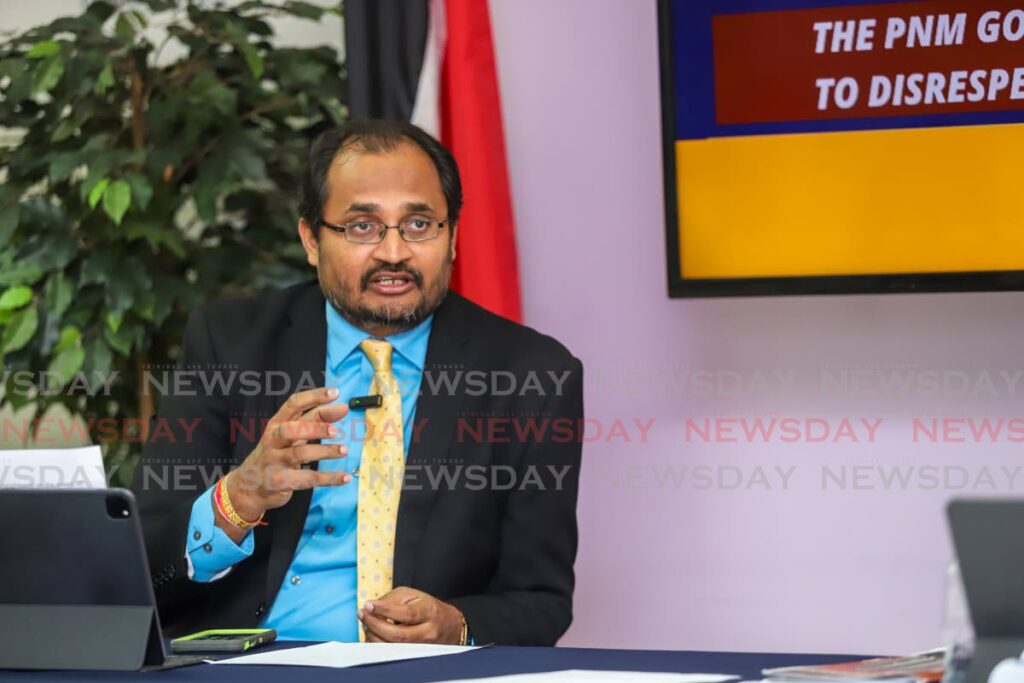The devil’s in the economic details

DINESH RAMBALLY
THE ECONOMIC Bulletin of January (Volume XXV No 1) from the Central Bank makes interesting reading on international issues. However, does it reflect the reality of the challenges the citizens of the country are experiencing?
The facts are overwhelming as to the deteriorating standard of living, lack of opportunities for our young people, failing infrastructure, no growth in small and medium-size businesses, frustrating government bureaucracy and inefficiency, long queues for foreign exchange, and increased cost of living, to name just a few.
Nowhere in the report is there cogent evidence that things will improve. The report mentioned countless times that the performance indicators are driven by high energy prices and not as a result of government policies, a fact well known to every citizen.
It is common knowledge that the recent most welcome high energy prices have provided us with a lifeline and to allow us to chart our economy so as to withstand fluctuations in external prices of our main commodities. It is also clear that the Government has not taken advantage of this opportunity. Let’s examine some key notes and basic facts from the report.
The report stated that inflation in 2022 reached heights that have not been seen in decades as a result of the Russia-Ukraine war and the impact of the covid19 pandemic. Due to higher interest rates which increased the cost of borrowing and reduced consumer demand, global growth slowed in the third quarter of 2022.
The situation in Trinidad and Tobago is that core inflation increased to 6.6 per cent (year-on-year) in November 2022, up from 4.1 per cent in June 2022 (see page 30). During the five months to November 2022, headline inflation averaged 6.8 per cent (year-on-year) – the highest five-month average rate since late 2014 (see page 29). The result is that your money is losing its purchasing power. The population is being reduced to being the working poor.
Energy prices remained high due to geopolitical tensions. However, this unplanned occurrence benefitted the local economy, providing the Government with a windfall, allowing it to boast of the first budgetary surplus in 14 years.
Energy prices are quite volatile and TT’s economy has been thrown a short lifeline by the elevated energy prices. Notwithstanding the two-year approval from the US to extract gas from the Dragon Field, which most experts agree is impractical and unrealistic, economic diversification remains a moot point for the Rowley administration.
Suppose this Dragon deal does not materialise as expected, then what? The current reality, according to the Central Bank report, activity in the energy sector was negatively influenced by reduced activity in the petrochemicals and condensate extraction sub-sectors.
To get to some specifics mentioned in the report that the Government needs to address:
1. The report stated that the US Henry Hub natural gas price averaged US$6.72 from July to December 2022. The current price is US$2.56. What is the Government’s strategy to deal with this fallout (see page 19)?
2. Non-energy revenue from October to December 2022 declined from $7,227 million to $6,411 million, which is more than ten per cent when compared with the same period in 2021. This is in spite of CSO data which the report conveniently used to speak of growth in the non-energy sector (see page 35).
3. The report stated that in 2023, our domestic economy is expected to improve, bolstered by activity in the energy sector. With the decline in energy prices, where is the recovery expected (see page 7)?
4. Although there was a significant inflow in foreign exchange from high commodity prices, the gross official reserves declined in December 2022 as compared to 2021 (see page 55).
While the Central Bank Bulletin reported with respect to the non-energy sector, preliminary data suggest that momentum may have reduced in the third quarter of 2022.
Our economy is still too heavily dependent on the energy sector. If one goes deeper into the equation it would be noted that most of the economic activity is dependent on state spending. As everyone knows, expenditure by the State is inherently inefficient, which translates into taxpayers not getting value for money.
While the Central Bank report gives a lot of numbers and statistics, it is important for one to go beyond the numbers to obtain the big picture and elucidate a strategy to move the economy forward. Quoting figures without developing a strategy for moving the economy, which the Government is famous for doing, is a worthless exercise.
Why doesn’t the Rowley-led Government examine the report and look at the implications for policy improvements, adjustments and strategy formulation to better secure the economic future for our country? The economic mismanagement continues with the Government being oblivious to the plight of the population.
Dinesh Rambally is the MP for Chaguanas West


Comments
"The devil’s in the economic details"